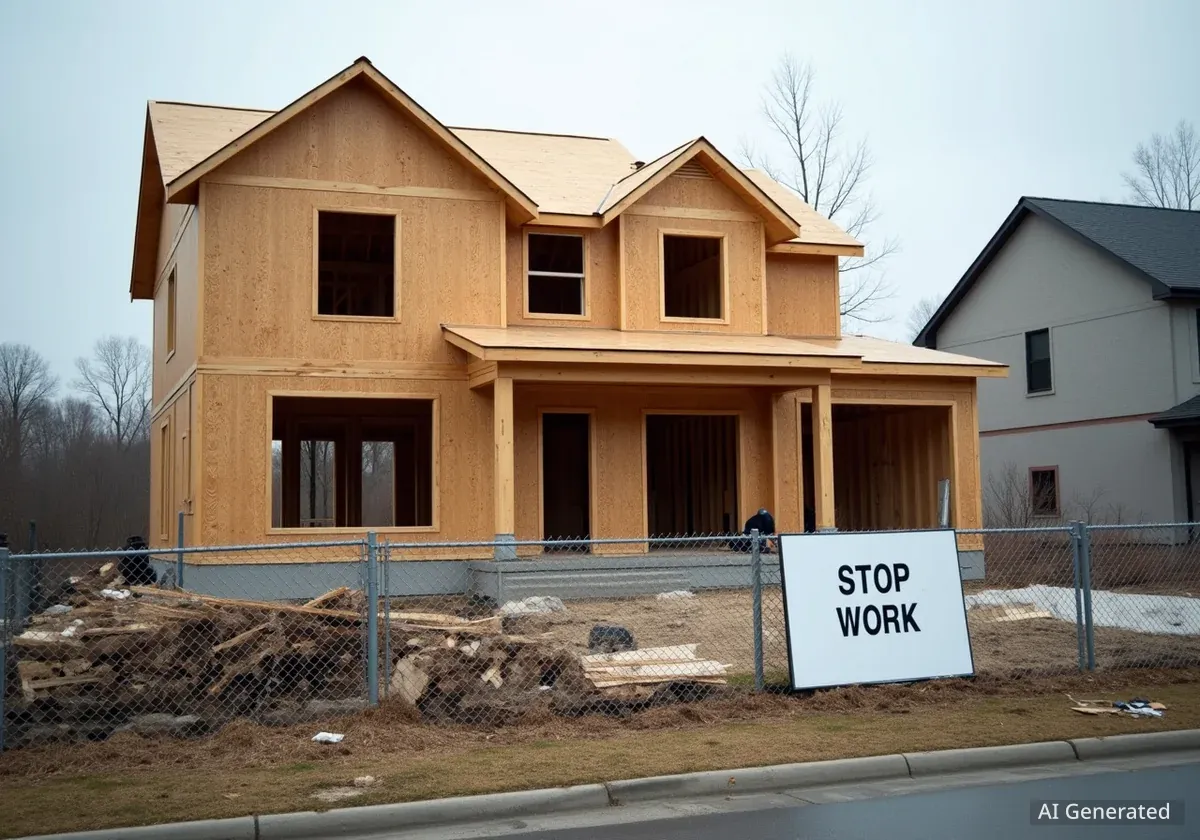A federal government shutdown, triggered by a legislative impasse on funding, extends far beyond Washington D.C., creating significant disruptions for the U.S. real estate market. While the immediate effects may seem temporary, prolonged shutdowns can delay property sales, halt new construction, and introduce economic uncertainty that affects buyers, sellers, and renters nationwide.
The suspension of key government services creates bottlenecks in mortgage lending, flood insurance processing, and affordable housing development, with consequences that can linger long after funding is restored.
Key Takeaways
- A government shutdown can delay mortgage approvals and property closings due to the unavailability of essential services like IRS income verification and federal flood insurance programs.
- The halt in the release of federal economic data, such as jobs reports, creates uncertainty for the Federal Reserve, potentially delaying interest rate decisions that influence borrowing costs.
- Federally-funded housing initiatives, including Section 8 voucher payments and new affordable housing projects, face significant delays or suspension, impacting both tenants and developers.
- While the commercial real estate sector may see minimal impact from a short shutdown, prolonged events can disrupt sensitive financing and development timelines.
Immediate Disruptions in Lending and Insurance
One of the most immediate impacts of a government shutdown on real estate is the disruption to the lending process. Many mortgage lenders rely on federal agencies for critical information needed to approve loans. For instance, lenders often need to verify a borrower's income by requesting tax transcripts from the Internal Revenue Service (IRS), a service that becomes unavailable during a shutdown.
This delay can jeopardize time-sensitive transactions, especially for buyers who need to close by a specific date. Similarly, refinancing efforts can be stalled, putting property owners at risk if they are trying to secure a new loan to avoid default or foreclosure.
Flood Insurance Program Suspended
The shutdown also effectively suspends the National Flood Insurance Program (NFIP), which is managed by the federal government. While existing policies remain active, no new policies can be issued or renewed during the funding lapse. This is a critical issue in coastal and flood-prone areas where flood insurance is mandatory for securing a mortgage.
A Critical Hurdle for Homebuyers
According to the National Association of Realtors, the inability to secure new flood insurance policies during a shutdown can lead to thousands of delayed or canceled home sales each month, particularly in states susceptible to hurricanes and flooding.
Steve Triolet, senior vice president of research and market forecasting at Partners Real Estate, noted that these disruptions are the primary concern. He explained that while the overall real estate market might only see temporary effects, specific transactions are highly vulnerable.
"In lending, timing is everything — especially in sensitive situations like refinancing a property to avoid default or foreclosure. In those cases, delays in government processing or interruptions in data access...could have real implications."
Economic Uncertainty and Interest Rate Decisions
A shutdown also creates a significant information vacuum for economists and policymakers. Federal agencies like the Bureau of Labor Statistics and the Census Bureau stop publishing key economic data, including monthly jobs reports, inflation figures, and housing starts.
This lack of fresh data makes it difficult for businesses and investors to assess the health of the economy. More importantly, it complicates the decision-making process for the Federal Reserve, which relies on this information to set monetary policy.
The Fed's Dilemma
The Federal Reserve's Federal Open Market Committee (FOMC) meets regularly to decide on the federal funds rate, which influences interest rates on mortgages, car loans, and credit cards. Without up-to-date economic indicators, the central bank may choose to act more cautiously.
According to James McCann, a senior economist at Edward Jones, this data blackout could make the central bank hesitant to adjust interest rates. A prolonged shutdown could lead the Fed to postpone potential rate changes until it has a clearer picture of the economy.
This uncertainty directly affects homebuyers and sellers. Those hoping for lower mortgage rates might have to wait longer, while the general ambiguity can cause some potential buyers to pause their search, leading to a temporary slowdown in market activity.
Affordable and Subsidized Housing Projects Face Delays
The impact of a government shutdown is particularly severe for federally-subsidized housing programs. The Department of Housing and Urban Development (HUD) plays a central role in funding and overseeing these initiatives, and its operations are significantly curtailed during a shutdown.
For tenants who rely on Section 8 housing vouchers, a short-term shutdown may not cause immediate problems. However, if the shutdown extends for several weeks, the public housing authorities that distribute federal funds to landlords could run out of money. This would leave landlords without payment and create immense stress for low-income families.
New Development Grinds to a Halt
Beyond existing programs, a shutdown halts progress on new affordable housing developments that depend on federal financing or approval. Developers seeking HUD grants, loans, or permits will find their applications frozen until the government reopens.
Rebecca Simon, a partner at the law firm Nixon Peabody, highlighted the immediate consequences for these projects.
"Unfortunately, there will be real-world impacts to development deals in the pipeline very quickly. All processing will be halted from the HUD perspective...the vast majority of development and preservation deals will be put on hold until the government opens back up."
This freeze on development exacerbates the existing shortage of affordable housing in many parts of the country, delaying critical projects that communities rely on.
Understanding the Mechanics of a Federal Shutdown
A federal government shutdown occurs when Congress fails to pass funding legislation, known as appropriations bills or continuing resolutions, to finance government operations for the upcoming fiscal year. Without this authorization, federal agencies must cease all non-essential functions.
However, not all government activity stops. Operations considered essential for national security, public safety, and the protection of life and property continue. These typically include:
- Military operations and national security
- Federal law enforcement and border protection
- Air traffic control
- Distribution of benefits like Social Security and Medicare
While these services continue, the federal employees who perform them may be required to work without pay until the shutdown ends. Congress has historically approved retroactive pay for all furloughed and essential federal workers after a shutdown concludes.
Non-essential services are suspended, leading to the closure of national parks and museums, delays in processing passports, and the suspension of many regulatory and administrative functions that impact various industries, including real estate. The longer a shutdown lasts, the more widespread and severe the economic and social consequences become.





